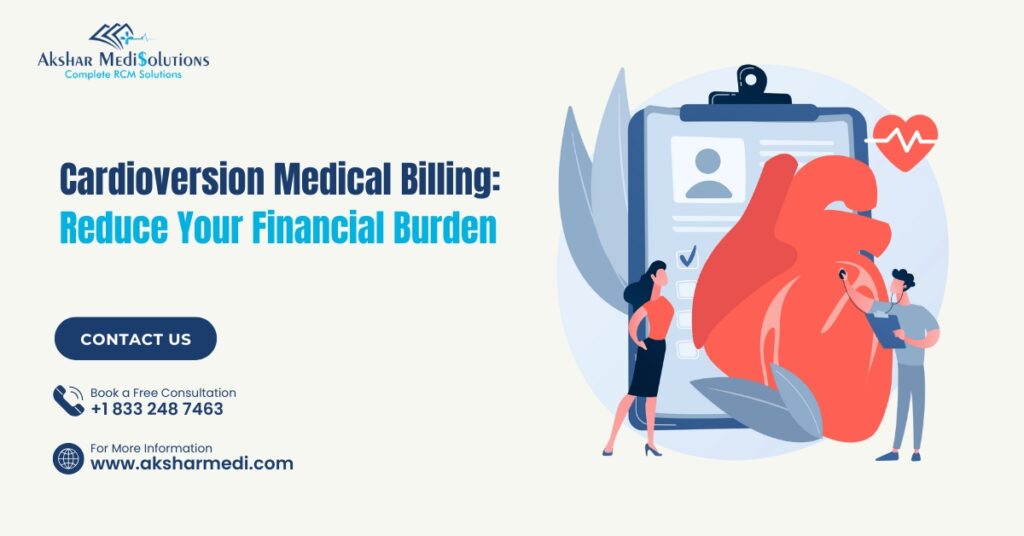If you’ve ever faced the word “cardioversion,” chances are your heart wasn’t the only thing skipping a beat. Cardioversion—a procedure that uses electricity or medication to reset an irregular heart rhythm—can save your life. But the bill? That’s where the real chest pain starts.
For many patients, the surprise comes after the hospital glow fades. A statement lands in your mailbox, stuffed with cryptic codes, out-of-network fees, and numbers that look more like a mortgage than a medical service. If you’ve been there—or you’re preparing for a cardioversion—you don’t just need clinical details. You need to know how cardioversion medical billing works, what to expect, and how to keep your financial burden in check.
That’s where expert guidance from a trusted partner like Akshar MediSolutions, a leading Medical Billing Company in New Jersey, can make all the difference.
What Exactly Is Cardioversion? (And Why It Costs So Much)
Cardioversion is usually done for atrial fibrillation (AFib) or atrial flutter. Think of it as rebooting your computer when it freezes, only this time the “computer” is your heart.
There are two main types:
Electrical Cardioversion: A short, controlled electric shock delivered to the chest. Done under sedation, usually in a hospital.
Pharmacological Cardioversion: Medication that nudges your heart back into rhythm.
Here’s why it isn’t cheap:
Hospital or outpatient facility fees – you’re paying for the room, the staff, and all the equipment.
Physician fees – the cardiologist, anesthesiologist, and possibly other specialists.
Follow-up care and testing – EKGs, blood work, and monitoring.
Why Cardioversion Billing Gets Complicated
Billing for cardioversion isn’t a one-line item. It’s a mix of CPT codes (for example, 92960 for electrical cardioversion), hospital facility charges, and anesthesia services. If any code is entered incorrectly—or if an out-of-network provider sneaks into the mix—your claim may get denied or inflated.
This is exactly why practices partner with specialists like Akshar MediSolutions, which offers Cardiology Billing Services in New Jersey. Their coding experts know the nuances of cardiology procedures and can help ensure proper documentation, coding, and reimbursement.
How to Reduce Your Cardioversion Bill
1. Request an Itemized Bill
Never settle for vague statements. Ask for a line-by-line bill. Errors like duplicate anesthesia charges are more common than you’d think.
2. Verify CPT & ICD-10 Codes
If the diagnosis code doesn’t match the procedure (say, “arrhythmia unspecified” instead of “atrial fibrillation”), insurance might deny part of the claim.
3. Negotiate with the Hospital
Hospitals often have prompt-pay discounts or financial aid programs. Patients have successfully shaved 20–50% off bills by simply asking.
4. Double-Check Network Status
Even if your cardiologist is in-network, your anesthesiologist or radiologist may not be. Always confirm each provider’s network status.
5. Use Your Insurance Advocate
Most insurers have billing advocates who can reprocess claims or appeal denials. Don’t be shy—call them.
6. Leverage Professional Billing Help
Partnering with a Medical Billing Company in New Jersey like Akshar MediSolutions ensures claims are coded accurately and submitted cleanly, reducing denials and speeding up reimbursement.
Final Takeaway: Don’t Let Billing Shock You
Cardioversion is stressful enough without the financial aftershock. But you’re not powerless. With the right strategy—requesting itemized bills, verifying codes, negotiating, and appealing—you can cut thousands off your bill.
And if it feels like too much to handle? That’s exactly what Akshar MediSolutions is here for. As a trusted Medical Billing Company in New Jersey with deep expertise in Cardiology Billing Services in New Jersey, they help patients and providers reduce denials, maximize reimbursements, and ease the financial burden of life-saving care.
FAQs About Cardioversion Billing
You can’t refuse anesthesia or monitoring—it’s about safety. But you can avoid duplicate tests if you’ve had them recently elsewhere.
Denials are often caused by coding errors. File an appeal and ask your doctor’s office to submit supporting documentation.
Yes, Medicare Part B usually covers it if medically necessary, though you’ll still pay coinsurance and the Part B deductible.

